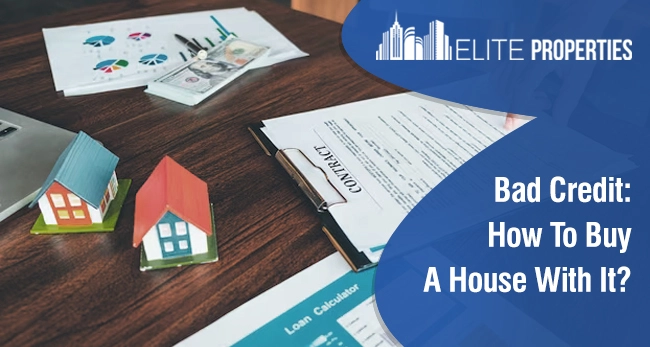Buying a house is a huge financial decision but if you’re stuck with bad credit, your dream of buying a house may shatter. Getting a loan when initiating the home-buying process with it can feel almost impossible.
Well, you still can buy it! Yes, buying a house with it is possible. Among Americans, 16% have bad credit. It’s important to know that it does not automatically rule someone out of the mortgage application process. Lenders evaluate loan applications based on a number of aspects. Credit history is but one component of the whole picture.
Let us help you understand more about it and how you could buy a house with it. Keep reading!
What Is Bad Credit?
A bad credit history indicates that the borrower has historically struggled to make credit repayments. Basically, a borrower’s failure to fulfill its obligations communicated to agencies via a bad credit history.
Your payment history, the amount you owe relative to your available credit, the duration of your credit history, the mix of your credit, and the number of credit accounts you have are the five main elements that determine your score.
In fact, the term “bad” credit score is relative. All too often, low scores are misinterpreted as “bad.” You may have never in your life missed a payment or collection.
However, using all of the credit on a few cards can also reduce your score and create the appearance of it. Therefore, the lender will consider all relevant factors when reviewing your loan application, providing you with an edge.
What Is Considered A Bad Credit Score By Mortgage Lenders?
When your score or payment history is below the minimal requirements set by your lender, you’re considered to have it by mortgage lenders.
On a scale of 300 to 850, some mortgage lenders require a minimum score of 500; others might also set their floor at 580 or 620 or higher.
However, it doesn’t exist in the eyes of a mortgage lender. It needed only to approve a mortgage application is qualifying credit, which is the minimal score needed.
If your score is less than 500, you may find it difficult to obtain a mortgage and will likely need to work on raising it first.
Many lenders use FICO score ranges. Check out these ranges:
Score range : Rating
Below 580 : Poor
580-669 : Fair
670-739 : Good
740 – 799 : Very good
800 or above : Excellent
Can You Buy A House With Bad Credit?
It’s not impossible to buy a house if you have a bad score or your score isn’t high enough. Lenders that work with buyers with poor score levels do offer bad credit mortgage options. Finding the proper lender and increasing your chances of approval are crucial.
Lenders don’t always care about your score, thus their minimum scores differ. Whether you’ll be able to repay them each month is what matters most to them.
One of the many factors that a mortgage lender considers is credit score. Lenders are also concerned with other factors like work stability, your yearly income, the house you’re purchasing, and so on.
How To Buy A House With It?
Below are steps that can help you buy a house even with it:
Step 1: Analyze Your Credit Score
To obtain a mortgage despite having bad credit, you must first analyze and determine the details of your report, which is the foundation for your credit score. To accomplish this, get a copy of your report from Experian, Transunion, or Equifax, the three main bureaus.
Step 2: Find Out Home Loan Options
There are various mortgage types, each with a distinct minimum score requirement. All of them will provide financing options for individuals with less-than-ideal, though some are more flexible than others.
These options can include:
- Conventional Loans
- FHA Loans
- VA Loans
- USDA Loans
Step 3: Get a Mortgage Pre-approval
With a mortgage pre-approval for a home loan, the lender lets sellers know you’re a serious buyer who won’t squander their time. Even though you’re not sure if you qualify for a loan, get in touch with a lender to start the process.
Step 4: Make Other Financial Improvements
Apart from score focus on other financial factors like income, savings, and previous loans. Have a well-managed budget to track your income and expenses.
This can ensure a lender that you can manage your finances well and meet your mortgage obligations. Lastly, you can also try to pay off outstanding debts if any.
Step 5: Avoid Making Credit Mistakes
Making late payments or missing payments should be avoided as these actions can seriously harm your credit. Furthermore stay away from applying for additional cards, since this can temporarily reduce your score.
In addition, you should refrain from canceling previous accounts as this might shorten your history and lower your total amount of accessible credit. Finally, make every effort to use as little credit as possible.
The Final Say: It’s Possible To Get A Home Loan With It
‘Even with bad it, it is feasible to purchase a home. By changing your spending patterns, you could raise your credit scores. Small changes can have a significant impact. Having it, however, does not preclude you from becoming a homeowner. Qualifying credit is that require for qualifying.
Alternative loan options can still offer the chance to become a homeowner. Before you commit to any loan, carefully review the terms, fees, interest rates, and total impact on your financial status. You can consult with a reliable financial advisor or mortgage specialist. They can guide you through the different mortgage alternatives available so you can decide wisely.
Need more profound support? Get in touch with Elite Properties today!

